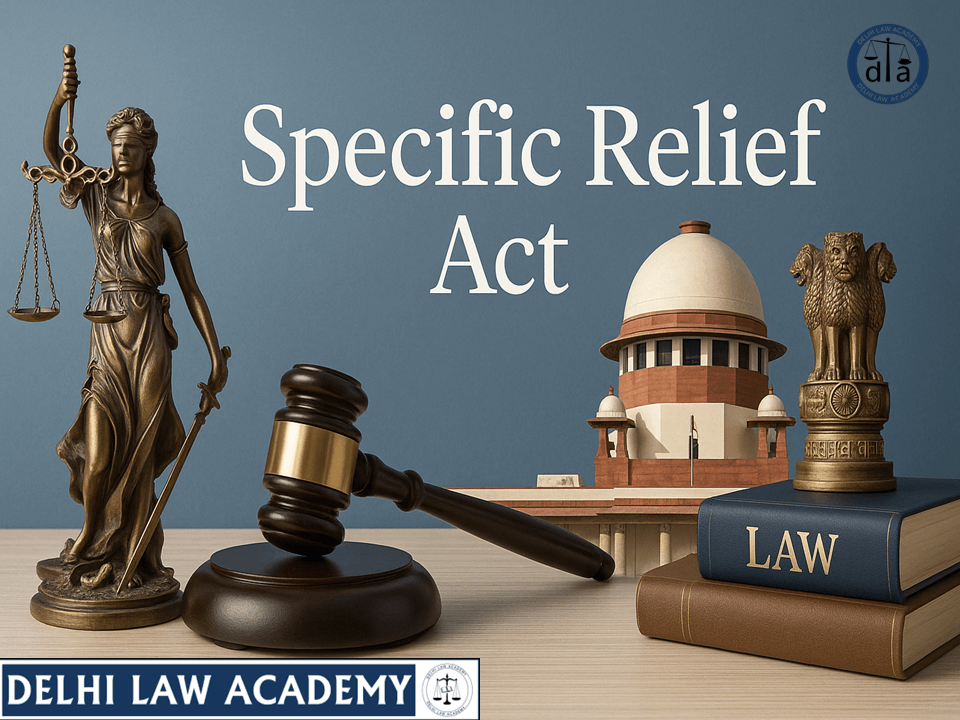
⚖️ Specific Relief Act: Specific Performance of Agreement to Sell
📘 Topic: Old Section 20
• Judicial principles which guided the discretion of the court under the old section 20
Supreme Court in Satya Jain v. Anis Ahmed Rushdie [2013 SC]:
• It must however be emphasised that efflux of time and escalation of price of property, by itself, cannot be a valid ground to deny the relief of specific performance.
Supreme Court in KS Vidyanadam v. Vairavan [1997 SC]:
• In the case of agreement of sale relating to immovable property, time is not of the essence of the contract unless specifically provided to that effect.
• The courts will also “frown” upon suits which are not filed immediately after the breach/refusal
📜 The old section 20 as it stood before 1.10.2018
Section 20(1) — Discretion as to decreeing specific performance
- The jurisdiction to decree specific performance is discretionary and
- the court is not bound to grant such relief
- merely because it is lawful to do so
- but
- the discretion of the court is not arbitrary but sound and reasonable
- guided by judicial principles and capable of correction by a court of appeal
⚖️ The judicial principles which guided the discretion of the court:
Satya Jain v. Anis Ahmed Rushdie [2013 SC]:
The long efflux of time (over 40 years) that has occurred and the galloping value of real estate in the meantime are the twin inhibiting factors in this regard. The same, however, have to be balanced with the fact that the plaintiffs are in no way responsible for the delay that has occurred and their keen participation in the proceedings till date show the live interest on the part of the plaintiffs to have the agreement enforced in law.
The discretion to direct specific performance of an agreement and that too after elapse of a long period of time, undoubtedly, has to be exercised on sound, reasonable, rational and acceptable principles. The parameters for the exercise of discretion vested by Section 20 of the Specific Relief Act, 1963 cannot be entrapped within any precise expression of language and the contours thereof will always depend on the facts and circumstances of each case. The ultimate guiding test would be the principles of fairness and reasonableness as may be dictated by the peculiar facts of any given case, which features the experienced judicial mind can perceive without any real difficulty. It must however be emphasised that efflux of time and escalation of price of property, by itself, cannot be a valid ground to deny the relief of specific performance. […]
The twin inhibiting factors identified above if are to be read as a bar to the grant of a decree of specific performance would amount to penalising the plaintiffs for no fault on their part; to deny them the real fruits of a protracted litigation wherein the issues arising are being answered in their favour.” In directing specific performance of the agreement, this Court in Satya Jain (supra) held that sale deed must be executed for the current market price of the suit property.
KS Vidyanadam v. Vairavan [1997 SC]:
It has been consistently held by the courts in India that in the case of agreement of sale relating to immovable property, time is not of the essence of the contract unless specifically provided to that effect. The period of limitation prescribed by the Limitation Act for filing a suit is three years. From these two circumstances, it does not follow that any and every suit for specific performance of the agreement (which does not provide specifically that time is of the essence of the contract) should be decreed provided it is filed within the period of limitation notwithstanding the time-limits stipulated in the agreement for doing one or the other thing by one or the other party. That would amount to saying that the time-limits prescribed by the parties in the agreement have no significance or value and that they mean nothing.
In this case, the suit property is the house property situated in Madurai, which is one of the major cities of Tamil Nadu. The suit agreement was in December 1978 and the six months’ period specified therein for completing the sale expired with 15-6-1979. The suit notice was issued by the plaintiff only on 11-7-1981, i.e., more than two years after the expiry of six months’ period. The question is what was the plaintiff doing in this interval of more than two years? There is not a single letter or notice from the plaintiff to the defendants calling upon them to get the tenant vacated and get the sale deed executed until he issued the suit notice on 11-7-1981. It is not the plaintiff’s case that within six months’, he purchased the stamp papers and offered to pay the balance consideration.
In the case before us, it is not mere delay. It is a case of total inaction on the part of the plaintiff for 2 1/2 years in clear violation of the terms of agreement which required him to pay the balance, purchase the stamp papers and then ask for execution of sale deed within six months. Further, the delay is coupled with substantial rise in prices — according to the defendants, three times — between the date of agreement and the date of suit notice. The delay has brought about a situation where it would be inequitable to give the relief of specific performance to the plaintiff.
Till the issue is considered in an appropriate case, we can only reiterate what has been suggested in K.S. Vidyanadam [1997 SC]:
- The courts, while exercising discretion in suits for specific performance, should bear in mind that when the parties prescribe a time/period, for taking certain steps or for completion of the transaction, that must have some significance and therefore time/period prescribed cannot be ignored.
- The courts will apply greater scrutiny and strictness when considering whether the purchaser was “ready and willing” to perform his part of the contract.
- Every suit for specific performance need not be decreed merely because it is filed within the period of limitation by ignoring the time-limits stipulated in the agreement. The courts will also “frown” upon suits which are not filed immediately after the breach/refusal. The fact that limitation is three years does not mean that a purchaser can wait for 1 or 2 years to file a suit and obtain specific performance. The three-year period is intended to assist the purchasers in special cases, as for example, where the major part of the consideration has been paid to the vendor and possession has been delivered in part-performance, where equity shifts in favour of the purchaser.
📚 Specific Relief Act: Substituted Performance of Contract – Section 20
🕰️ Section 20: Amended Section (Effective 1.10.2018)
Section 20(1) – Substituted performance of contract
- Without prejudice to the generality of provisions in the Indian Contract Act 1872 and except as otherwise agreed upon by the parties
- Where the contract is broken due to non-performance of promise by any party
- The party who suffers by such breach shall have the option of substituted performance
- Through a third party or by his own agency and recover the expenses and other costs actually incurred or suffered by him from the party committing such breach
Section 20(2)
- No substituted performance shall be undertaken unless the party suffering breach has given a notice in writing of not less than thirty days to the party in breach
- Calling upon him to perform the contract within the time specified in the notice
- On refusal or failure, the party may get the contract performed by a third party or by his own agency
Proviso
- The party who suffers breach shall not be entitled to recover the above expenses and costs unless the contract is performed through a third party or by his own agency
Section 20(3)
- Where the party suffering breach has got the contract performed through a third party or by his own agency after giving notice
- He shall not be entitled to claim relief of specific performance against the party in breach
Section 20(4)
- This section shall not prevent the party who has suffered breach from claiming compensation from the party in breach
🕰️ The Old Section 20 (Before 1.10.2018)
Section 20(1) – Discretion as to decreeing specific performance
- The jurisdiction to decree specific performance is discretionary
- The court is not bound to grant such relief merely because it is lawful to do so
- The discretion of the court is sound and reasonable, guided by judicial principles and capable of correction by a court of appeal
Judicial Principles:
- Nirmala Anand v. Advent Corporation [2002 SC]
- Grant of specific performance lies in the discretion of the court
- Reasonable conditions, including payment of additional amount, can be imposed
- Ordinarily, plaintiff is not denied relief only due to phenomenal increase in price during pendency of litigation
- Shenbagam v. K.K. Rathinavel [2022 SC]
- Readiness of respondent refers to financial capacity to pay balance consideration
- Time is generally not of the essence in agreements for sale of immoveable property
⚖️ Supreme Court Case: Shenbagam v. K.K. Rathinavel [2022 SC]
The inconsistency in the respondent’s conduct, lack of communication with appellants, and delay of about three years from the date fixed for performance are indicative of lack of will to perform.
Readiness refers to whether the respondent was financially capable to pay the balance consideration. The plaintiff must prove readiness and willingness to perform the contract; the burden lies on the plaintiff.
Generally, time is not of essence in agreements for sale of immoveable property. Courts consider conduct of parties, escalation of property price, and whether any party unfairly benefits from the decree to ensure no injustice is caused.
📚 Continue Your Specific Relief Act Preparation
Don’t stop here! Strengthen your knowledge of the SRA with our other fully solved tests:
📘 Free Study Material for Judiciary Aspirants!
Download our FREE study material prepared by Delhi Law Academy’s expert faculty.
💬 Frequently Asked Questions (FAQs)
Specific Performance is a legal remedy under the Specific Relief Act, 1963 that allows the court to compel a party to fulfill their contractual obligations when monetary compensation is inadequate. It is commonly sought in agreements to sell immovable property.
Old Section 20 gave courts discretionary power to grant or refuse specific performance. The court could deny this relief even if it was lawful to grant it, provided its decision was guided by judicial principles and fairness.
While time is generally not the essence in agreements to sell immovable property, courts have emphasized that delays must be reasonable. As seen in K.S. Vidyanadam v. Vairavan (1997 SC), long, unexplained delays may lead to denial of specific performance.
No, price escalation or passage of time alone cannot be grounds for denial. In Satya Jain v. Anis Ahmed Rushdie (2013 SC), the Supreme Court clarified that efflux of time or increase in property value, by itself, is not a valid reason to refuse specific performance.
Court discretion under old Section 20 was guided by fairness, reasonableness, and the conduct of both parties. Relief could be denied if granting specific performance would result in undue hardship or inequitable outcomes for the defendant.
Buyers should act promptly after breach or refusal, maintain clear communication, ensure readiness and willingness to perform, and keep documentary proof of payments and correspondences to strengthen their case in court.
Contact us
📍 Delhi Law Academy – Jaipur Branch
6C, Tower 2, Coaching Hub, Pratap Nagar, Jaipur – 302033
📞 Phone:
+91 9911916552
+91 8447285606
✉️ Email:
contactus@delhilawacademy.com

